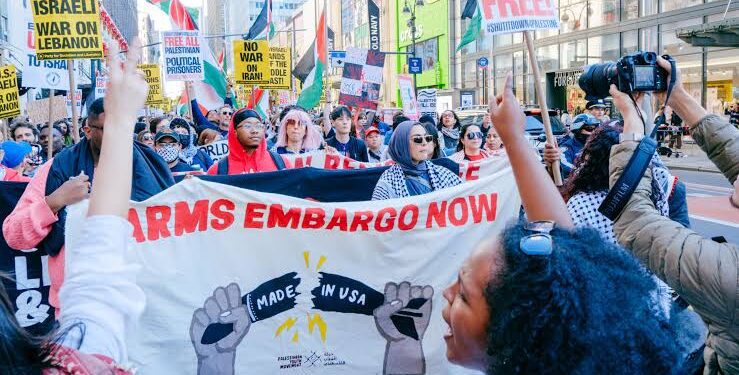On November 1, 2024, Turkey, joined by 52 other countries and two inter-governmental organizations, submitted a letter to the United Nations (UN) calling for a halt to Israel’s arms deliveries. The letter, delivered by Turkey’s Foreign Ministry, highlights concerns over Israel’s actions in Gaza, which Turkey and its allies describe as genocide. Turkish Foreign Minister Hakan Fidan, in a press conference in Djibouti on November 1, reiterated Turkey’s strong stance against arms sales to Israel, emphasizing that such actions contribute to the ongoing violence in Gaza. “Selling arms to Israel means participating in its genocide,” Fidan said, stressing the importance of international action in stopping the flow of weapons to Israel.
The letter, signed by 54 entities including nations like Brazil, Algeria, China, Russia, and organizations such as the Arab League and the Organization of Islamic Cooperation, underscores a growing call for the UN to impose an arms embargo on Israel.
Erdogan’s Call for UN Action
This move follows a call from Turkish President Recep Tayyip Erdogan, who, in late October 2024, urged the UN to take swift action to impose a comprehensive arms embargo on Israel. Erdogan has been vocal in his criticism of Israel throughout the conflict in Gaza, describing Israel’s actions as an attempt to spread conflict across the region.
Erdogan argued that the embargo would serve as an “effective solution” to pressure Israel to end its military operations in Gaza. He also warned that Israel would eventually “pay the price” for its actions, referring to what he has described as ongoing genocide in Gaza.
International Support and Opposition
While many countries have rallied behind Turkey’s call for an embargo, Israel’s primary arms suppliers, the United States and Germany, have resisted such measures. These two countries continue to supply Israel with crucial military resources, including advanced fighter jets and missiles. However, there has been some movement within the international community toward limiting arms shipments. French President Emmanuel Macron and British Prime Minister Keir Starmer have both expressed support for restrictions on arms sales to Israel, although they have stopped short of endorsing a full embargo.
Turkey’s Paradox: Calls for an Embargo Amid Continued Oil Deliveries
Despite Turkey’s leading role in calling for an arms embargo, it continues to allow the transit of oil from Azerbaijan to Israel. This oil, transported via the Baku–Tbilisi–Ceyhan pipeline and delivered to Israel, plays a crucial role in sustaining Israel’s military operations, particularly its air force and army in Gaza and Lebanon. Activists have called on Turkey to cut off these oil deliveries, accusing the Turkish government of indirectly supporting Israel’s military actions.
In addition, Turkish businesses have reportedly continued to engage in trade with Israel, despite a formal trade ban. Turkish exports to Palestine have surged dramatically in recent months, with goods being routed through Palestinian Authority customs to avoid direct transactions with Israel. This surge in exports, which has risen by 423% in 2024 compared to the previous year, points to a growing trend of indirect trade with Israel via Palestine.
The Growing Tension: Will the UN Act?
As international calls for accountability mount, the question remains whether the UN will take action in response to Turkey’s call for an arms embargo. While the UN has condemned the violence in Gaza, its ability to enforce such an embargo is unclear, especially given the geopolitical dynamics and the strong support Israel receives from the United States and other Western powers.
Will the United Nations act decisively to impose an arms embargo on Israel, or will the influence of Israel’s allies prevent meaningful action?
Related Stories:
Erdogan Declares Turkiye cut off all relations with Israel
New EU Sanctions on Israeli Settlers, Says France
France Considers New Sanctions Against Those Enabling Israeli Settlements in the West Bank
















